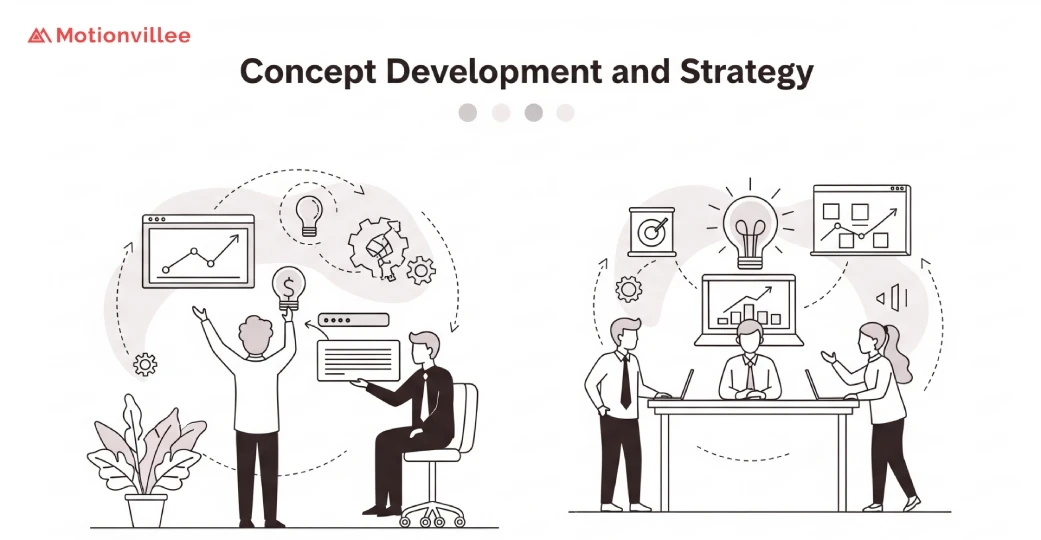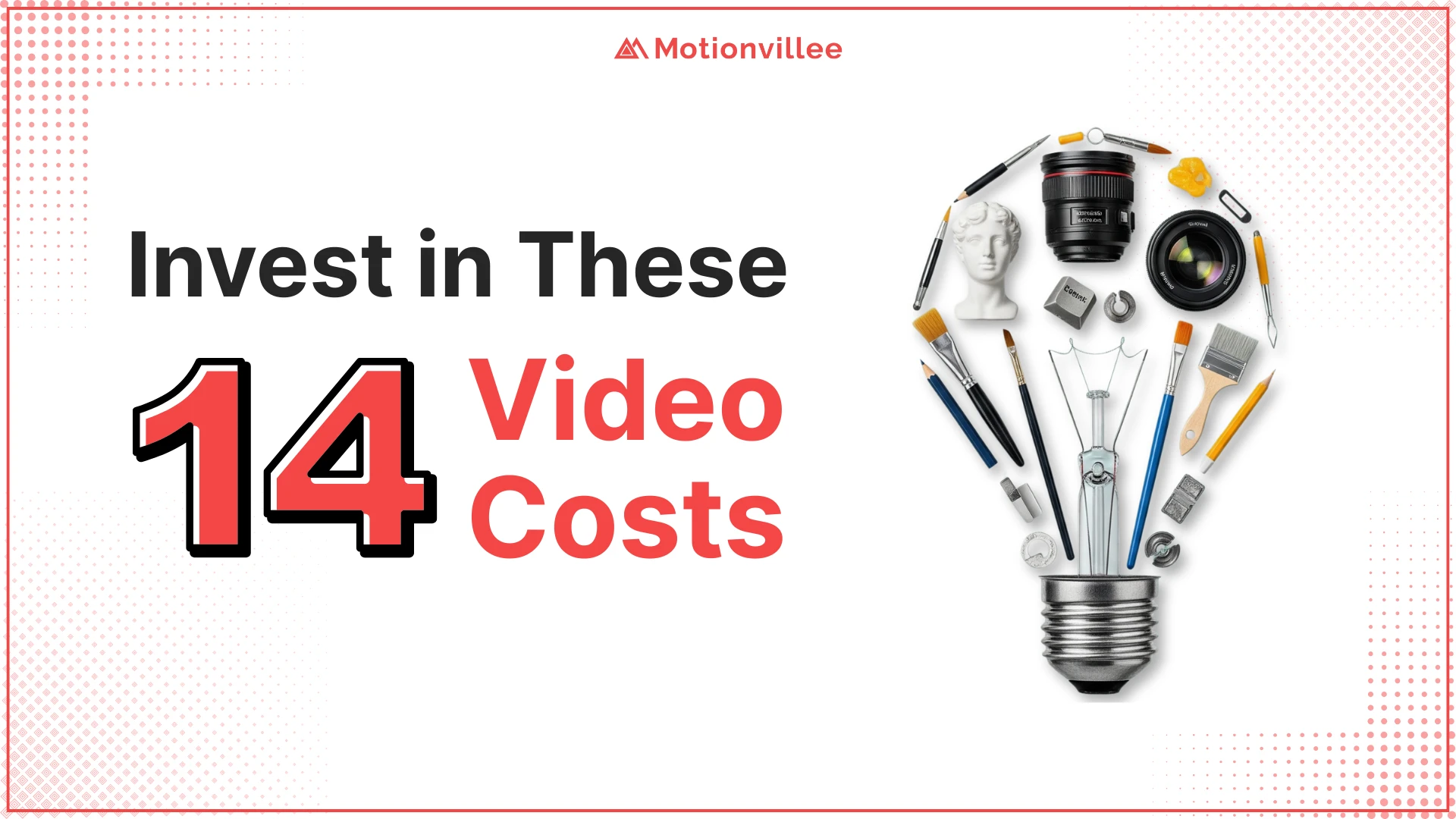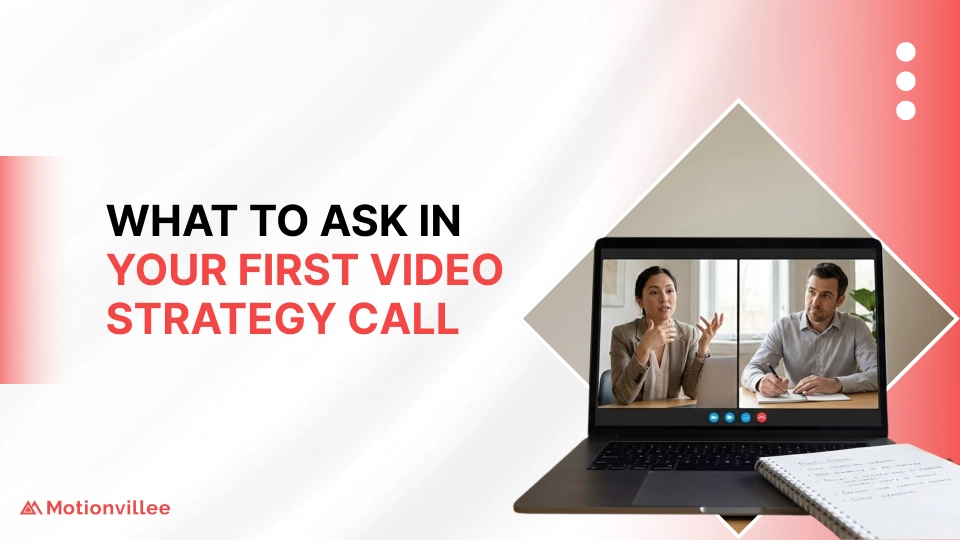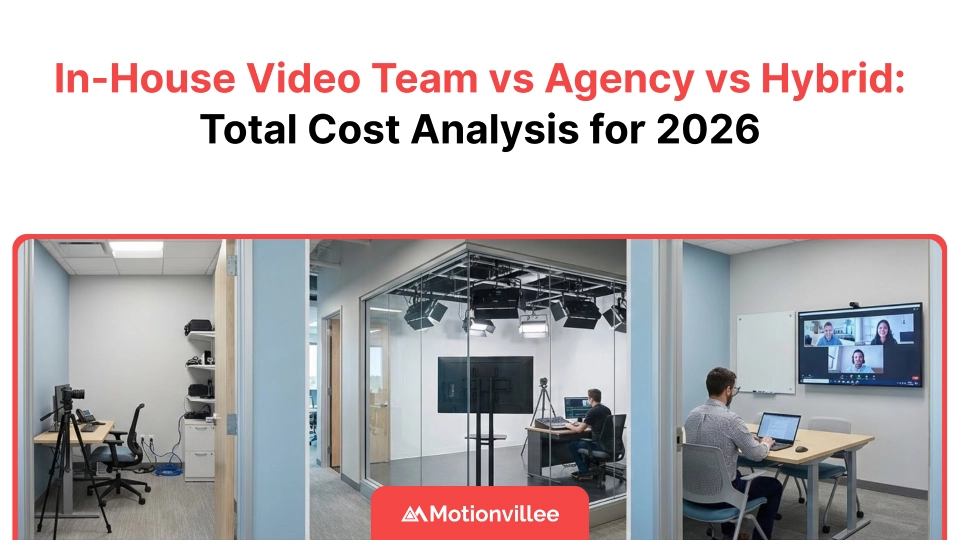When planning a new project, understanding where to spend on video production costs makes all the difference between an average output and a video that actually delivers results. Every dollar you invest shapes the quality, impact, and overall success of your campaign.
The real challenge most brands face is deciding which expenses truly add value and which ones can be avoided. Some areas like strong scripting or professional editing can directly influence performance, while others might look nice but add little to the outcome.
For B2B brands, this becomes even more critical. Strategic video content for b2b business has to balance storytelling with clear messaging that moves prospects forward.
In this blog, we will break down 14 costs that are worth paying for because they improve effectiveness and 5 that you can skip without hurting results.
A. Pre-Production Essentials
1. Concept Development and Strategy
This is where it all begins. Without a strong foundation, even the most polished visuals can fall flat. A clear concept and strategy align the video with brand goals, target audience, and funnel stage.
- Helps define tone, style, and objectives
- Ensures messaging is consistent with broader campaigns
- Saves time and money during production
For SaaS brands, strategic content production for saas ensures the video communicates complex ideas in a way prospects actually understand. Investing here prevents wasted resources later. Pair this with an Explainer Video to break down your product simply.

2. Scriptwriting
A video without a strong script is just visuals with no direction. A compelling script ensures your story flows smoothly, engages viewers, and delivers the intended message.
- Clarifies key points
- Structures messaging for retention
- Guides visuals, narration, and timing
The explainer video production process depends on excellent scripting to avoid confusion and keep prospects engaged. This is also where a Brand Explainer Video stands out, blending clarity with brand tone.
3. Storyboarding
Storyboarding is the visual blueprint of your video. It lays out scenes, transitions, and flow before production begins.
- Minimizes confusion during filming
- Provides a shared vision for the team
- Avoids costly reshoots and wasted time
For SaaS companies, storyboarding plays a big role in crafting the best saas explainer videos, since it helps visualize how complex workflows will be simplified for the audience. This planning also enhances the impact of a SaaS Video.
B. Production Must-Haves
4. Professional Videography Equipment
Great visuals depend on great tools. Professional cameras, lighting rigs, and audio equipment are non-negotiable if you want your video to look and sound credible.
- Increases production value instantly
- Ensures crisp, professional footage
- Captures audio that enhances rather than distracts
This is especially important when producing b2b brand videos that need to represent your company with authority. Quality gear combined with expertise makes all the difference. It also strengthens results for a B2B Video project.
5. Experienced Crew
Behind every successful video is a skilled team. Directors, videographers, and sound engineers bring technical and creative expertise to the table.
- Translates vision into professional execution
- Reduces mistakes during filming
- Ensures a smoother production schedule
For SaaS brands, an experienced team can create a saas product explainer that turns complexity into clarity. A crew skilled in storytelling also makes sure the Product Overview Video reflects your solution’s strengths.
6. High-Quality Set Design or Location
The setting communicates a lot about your brand. Whether you are shooting in-office, at a rented studio, or in a designed set, the right background reinforces credibility and tone.
Adds visual depth and context
Elevates professionalism and brand perception
Prevents distractions that pull focus away from the message
This is particularly useful for video production for small businesses looking to stand out and compete with larger players. A simple but thoughtful setup goes a long way.
7. Talent, Actors, or Presenters
The face of your video shapes how your audience perceives your message. Professional presenters or voice actors bring energy, credibility, and relatability that in-house staff may not always deliver.
- Builds trust and relatability
- Improves delivery and viewer engagement
- Helps maintain attention across longer videos
If your video is meant to close deals, using professionals for a b2b business video ensures delivery is polished and persuasive.
8. Cinematography and Lighting Expertise
Even the best script will fall flat without strong visuals. Cinematographers and lighting experts know how to create mood, highlight key visuals, and maintain consistency throughout.
- Enhances storytelling visually
- Shapes mood and brand perception
- Provides consistency across all scenes
This is essential when working with a saas explainer video company. Proper lighting and camera work can make complex topics both clear and visually engaging.
C. Post-Production Investments
9. Editing
Editing transforms raw footage into a polished final product. It controls pacing, rhythm, and emotional impact.
- Cuts unnecessary scenes
- Keeps viewers engaged from start to finish
- Ensures smooth transitions and narrative flow
Good editing is what makes product explainer videos effective and professional. It allows your video to tell a story instead of looking like a random collection of clips.
10. Sound Design and Mixing
Poor sound can ruin an otherwise great video. Clear audio, background scoring, and mixing balance elevate the overall experience.
- Improves clarity and professionalism
- Adds depth and mood with audio layers
- Keeps audience attention intact
Sound is just as important as visuals when it comes to maintaining audience engagement and brand trust.
11. Motion Graphics and Animation
Visual polish matters, especially for SaaS and B2B brands where complexity needs clarity. Motion graphics help explain processes, workflows, and abstract ideas in a simple, engaging way.
- Reinforces key points
- Simplifies technical concepts
- Keeps viewers visually engaged
High-quality animated explainer video production can turn a complex solution into something prospects understand in under 90 seconds.
12. Color Grading
Color grading is the subtle but powerful process of adjusting tones, contrast, and hues to create a consistent, professional look.
- Enhances mood and tone
- Provides visual consistency
- Elevates perception of quality
It ensures your video feels finished rather than amateur. Even if unnoticed by viewers, it influences how professional the video feels.
13. Custom Music or Licensing
Music sets the emotional tone of your video. Custom tracks or properly licensed music elevate the storytelling experience while keeping you safe from copyright issues.
- Supports brand identity
- Influences audience mood and retention
- Avoids generic or overused soundtracks
For B2B brands, professional soundtracks are a subtle but powerful way to stand out in a crowded market.
14. Subtitles and Accessibility
Adding subtitles is no longer optional. It improves accessibility, supports global audiences, and ensures engagement even when sound is off.
- Increases reach across regions
- Improves comprehension in noisy environments
- Makes content inclusive for hearing-impaired audiences
This cost pays for itself quickly by expanding your video’s usability and audience reach.
5 Video Production Costs You Can Skip
Not every cost brings real value. Many businesses overspend in areas that look impressive but do not improve results. Here are five video production costs you can safely skip or reduce:
Overly Expensive Props or Set Pieces
- Unless your video demands a very specific look, most props and set elements can be kept simple. Creativity often matters more than a large budget.
Premium Stock Footage Packages
- While stock footage can be useful, paying for overpriced packages is unnecessary. Custom shots are more authentic and often cheaper in the long run.
Redundant Crew Roles
- For small or mid-level projects, hiring extra assistants or overlapping roles adds little value. Focus on a lean but skilled crew instead.
Over-the-Top Special Effects
- Flashy effects might look cool but rarely align with brand messaging. If it does not serve the story, it is a waste of budget.
Extended Shooting Days
- These often happen because of poor planning. A clear schedule and storyboard prevent unnecessary costs.
Balancing Quality and Budget
The smartest approach to video production costs is balance. You do not need to choose between high quality and affordability if you plan correctly.
Here are some tips:
Match costs to goals
- If the video is for brand awareness, focus on creativity and clarity. If it is for sales enablement, prioritize scripting and editing.
Use resources wisely
- Invest in areas that directly improve the final product like strong storytelling, editing, and visuals. Cut back on extras that do not influence conversions.
Plan ahead
- Storyboarding, script approvals, and clear timelines save time and prevent expensive mistakes.
Strategic planning ensures your budget creates the maximum impact without waste.
Spend Smart, Get Better Results
The key to better videos is knowing where to invest and where to save. Paying for the right video production costs is not an expense but an investment in higher conversions, stronger branding, and long-term impact.
Review your current video budget, identify areas where money is being wasted, and reallocate those funds to the essentials that truly matter.
If you are ready to approach video the smart way, Schedule a call with Motionvillee. Together, we can create videos that balance quality and cost while driving real business results.





